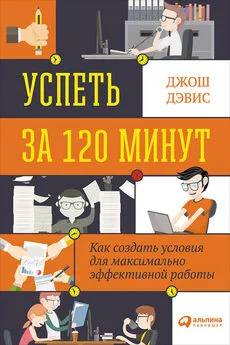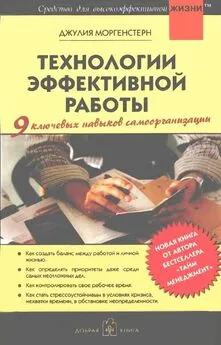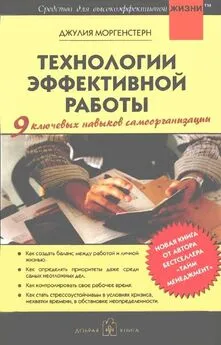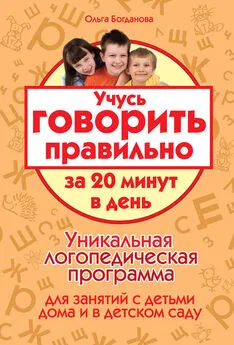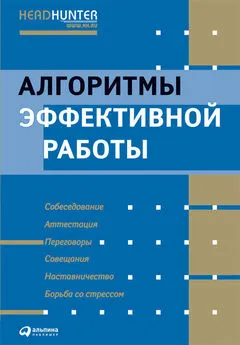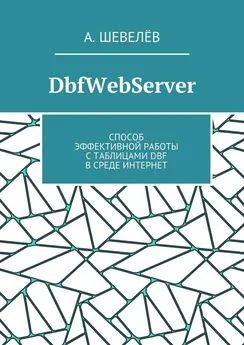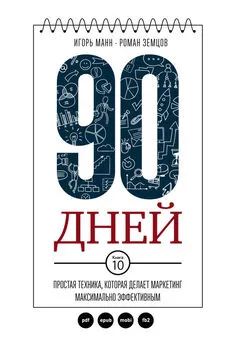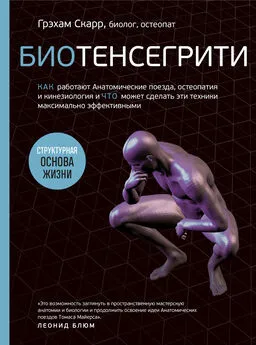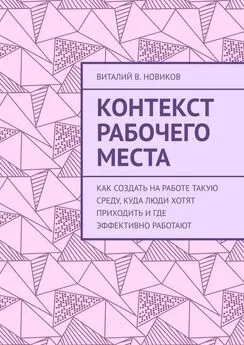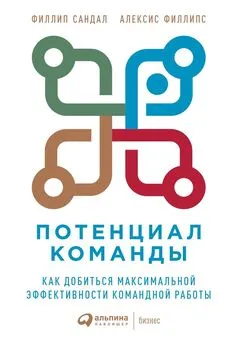Джош Дэвис - Успеть за 120 минут. Как создать условия для максимально эффективной работы
- Название:Успеть за 120 минут. Как создать условия для максимально эффективной работы
- Автор:
- Жанр:
- Издательство:Альпина Паблишер
- Год:2016
- Город:Москва
- ISBN:978-5-9614-4188-8
- Рейтинг:
- Избранное:Добавить в избранное
-
Отзывы:
-
Ваша оценка:
Джош Дэвис - Успеть за 120 минут. Как создать условия для максимально эффективной работы краткое содержание
Успеть за 120 минут. Как создать условия для максимально эффективной работы - читать онлайн бесплатно ознакомительный отрывок
Интервал:
Закладка:
54
Allan M. Collins and Elizabeth F. Loftus, «A Spreading-Activation Theory of Semantic Processing,» Psychological Review 82, no. 6 (1975): 407–28.
55
По неясным причинам научная литература редко дает ответы на вопрос, сколько времени в среднем люди могут заниматься одним и тем же. Вероятно, это слишком зависит от контекста.
56
Elizabeth R. Valentine and Philip L. G. Sweet, «Meditation and Attention: A Comparison of the Effects of Concentrative and Mindfulness Meditation on Sustained Attention,» Mental Health, Religion, and Culture 2, no. 1 (1999): 59–70. В этом исследовании среди тех, кто занимался медитацией, практикующие «осознанную» медитацию показывали лучшие результаты, чем занимавшиеся «сосредоточенной» медитацией.
57
Jonathan Smallwood and Jessica Andrews-Hanna, «Not All Minds That Wander Are Lost: The Importance of a Balanced Perspective on the Mind-Wandering State,» Frontiers in Psychology 4 (2013): 441.
58
Benjamin Baird et al., «Inspired by Distraction: Mind Wandering Facilitates Creative Incubation,» Psychological Science 23, no. 10 (2012): 1117–22.
59
Benjamin Baird, Jonathan Smallwood, and Jonathan W. Schooler, «Back to the Future: Autobiographical Planning and the Functionality of Mind-Wandering,» Consciousness and Cognition 20, no. 4 (2011): 1604–11.
60
Jonathan Smallwood, Louise Nind, and Rory C. O'Connor, «When Is Your Head At? An Exploration of the Factors Associated with the Temporal Focus of the Wandering Mind,» Consciousness and Cognition 18, no. 1 (2009): 118–25.
61
Jon Kabat-Zinn, «An Outpatient Program in Behavioral Medicine for Chronic Pain Patients Based on the Practice of Mindfulness Meditation: Theoretical Considerations and Preliminary Results,» General Hospital Psychiatry 4, no. 1 (1982): 33–47; и Jon Kabat-Zinn, Full Catastrophe Living (Revised Edition): Using the Wisdom of Your Body and Mind to Face Stress, Pain, and Illness (New York: Random House, 2013).
62
Maryanna D. Klatt, Janet Buckworth, and William B. Malarkey, «Effects of Low-Dose Mindfulness-Based Stress Reduction (MBSR-LD) on Working Adults,» Health, Education, and Behavior 36, no. 3 (2009): 601–14.
63
Philippe R. Goldin and James J. Gross, «Effects of Mindfulness-Based Stress Reduction (MBSR) on Emotion Regulation in Social Anxiety Disorder,» Emotion 10, no. 1 (2010): 83–91.
64
Linda E. Carlson and Sheila N. Garland, «Impact of Mindfulness-Based Stress Reduction (MBSR) on Sleep, Mood, Stress, and Fatigue Symptoms in Cancer Outpatients,» International Journal of Behavioral Medicine 12, no. 4 (2005): 278–85.
65
Scott R. Bishop et al., «Mindfulness: A Proposed Operational Definition,» Clinical Psychology: Science and Practice 11, no. 3 (2004): 230–41. Бишоп с соавторами дает такое определение «осознанности»: «Первый компонент связан с саморегуляцией внимания: она поддерживается на уровне непосредственного опыта, тем самым обеспечивая повышенное осознание ментальных событий в данный момент времени. Второй компонент связан с настройкой на определенную ориентацию человека по отношению к его опыту в данный момент времени – ориентацию, которая характеризуется любопытством, открытостью и одобрением» (с. 232).
66
Andy Clark, Being There: Putting Brain, Body, and World Together Again (Cambridge, MA: MIT Press, 1997); Antonio Damasio, Descartes' Error: Emotion, Reason, and the Human Brain (New York: HarperCollins, 1994); George Lakoff and Mark Johnson, Philosophy in the Flesh: The Embodied Mind and Its Challenge to Western Thought (New York: Basic Books, 1999).
Идея о том, что тело и сознание сложно взаимосвязаны, интуитивно понятна многим, но менее привычна в философских кругах. Из чтения литературы по этой теме становится ясно: представление о том, что сознание и тело действуют в основном по отдельности, есть плод изрядного количества непроверенных домыслов. Думаю, что такие домыслы влияют и на то, что мы считаем полезным занятием, – например, физические упражнения.
67
Stanley Schachter and Jerome E. Singer, «Cognitive, Social, and Physiological Determinants of Emotional State,» Psychological Review 69, no. 5 (1962): 379–99.
68
Nelson Mandela, Long Walk to Freedom: The Autobiography of Nelson Mandela (New York: Little, Brown and Company, 1994), 490.
69
Lot Verburgh et al., «Physical Exercise and Executive Functions in Preadolescent Children, Adolescents, and Young Adults: A Meta-Analysis,» British Journal of Sports Medicine 48, no. 12 (2014): 973–79.
70
Shannan E. Gormley et al., «Effect of Intensity of Aerobic Training on VO2max,» Medicine and Science in Sports and Exercise 40, no. 7 (2008): 1336–43.
71
Hiroki Yanagisawa, Ippeita Dan, Daisuke Tsuzuki, Morimasa Kato, Masako Okamoto, Yasushi Kyutoku, and Hideaki Soya, «Acute Moderate Exercise Elicits Increased Dorsolateral Prefrontal Activation and Improves Cognitive Performance with Stroop Test,» Neuroimage 50, no. 4 (2010): 1702–10.
72
Kevin C. O'Leary et al., «The Effects of Single Bouts of Aerobic Exercise, Exergaming, and Videogame Play on Cognitive Control,» Clinical Neurophysiology 122, no. 8 (2011): 1518–25.
73
Berit Inkster and Brian M. Frier, «The Effects of Acute Hypoglycaemia on Cognitive Function in Type 1 Diabetes,» British Journal of Diabetes and Vascular Disease 12, no. 5 (2012): 221–26.
74
Franciele R. Figueira et al., «Aerobic and Combined Exercise Sessions Reduce Glucose Variability in Type 2 Diabetes: Crossover Randomized Trial,» PLoS ONE8 , no. 3 (2013): e57733.
75
Steven J. Petruzzello et al., «A Meta-Analysis on the Anxiety-Reducing Effects of Acute and Chronic Exercise: Outcomes and Mechanisms,» Sports Medicine 11, no. 3 (1991): 143–82.
76
Eli Puterman et al., «The Power of Exercise: Buffering the Effect of Chronic Stress on Telomere Length,» PLoS ONE5 , no. 5 (2010): e10837.
77
Justy Reed and Deniz S. Ones, «The Effect of Acute Aerobic Exercise on Positive Activated Affect: A Meta-Analysis,» Psychology of Sport and Exercise 7, no. 5 (2006): 477–514.
78
Reed and Ones, «The Effect of Acute Aerobic Exercise,» 477–514.
79
Bryan D. Loy, Patrick J. O'Connor, and Rodney K. Dishman, «The Effect of a Single Bout of Exercise on Energy and Fatigue States: A Systematic Review and Meta-Analysis,» Fatigue: Biomedicine, Health and Behavior 1, no. 4 (2013): 223–42.
80
Alexa Hoyland, Clare L. Lawton, and Louise Dye, «Acute Effects of Macronutrient Manipulations on Cognitive Test Performance in Healthy Young Adults: A Systematic Research Review,» Neuroscience and Biobehavioral Reviews 32, no. 1 (2008): 72–85.
81
Edward Leigh Gibson, «Effects of Energy and Macronutrient Intake on Cognitive Function Through the Lifespan,» Proceedings of the Latvian Academy of Sciences, Section B, Natural, Exact, and Applied Sciences 67, nos. 4–5 (2013): 303–447.
82
Karina Fischer et al., «Cognitive Performance and Its Relationship with Postprandial Metabolic Changes After Ingestion of Different Macronutrients in the Morning,» British Journal of Nutrition 85, no. 03 (2001): 393–405.
83
Gibson, «Effects of Energy and Macronutrient Intake,» 303–447.
84
David Benton, «Carbohydrates and the Cognitive Performance of Children,» Carbohydrate News, Canadian Sugar Institute Nutrition Information Service, 2012, www.sugar.ca/SUGAR/media/Sugar-Main/PDFs/CarbNews2012_ENG-qxp_FINAL.pdf.
85
Hayley Young and David Benton, «The Glycemic Load of Meals, Cognition, and Mood in Middle and Older Aged Adults with Differences in Glucose Tolerance: A Randomized Trial,» e-SPEN Journal 9, no. 4 (2014): e147–54.
86
Simon B. Cooper et al., «Breakfast Glycaemic Index and Cognitive Function in Adolescent School Children,» British Journal of Nutrition 107, no. 12 (2012): 1823–32.
87
Paul Hewlett, Andrew Smith, and Eva Lucas, «Grazing, Cognitive Performance, and Mood,» Appetite 52, no. 1 (2009): 245–48.
88
Dale A. Schoeller, «Changes in Total Body Water with Age,» American Journal of Clinical Nutrition 50, no. 5 (November 1, 1989): 1176–81.
89
Ana Adan, «Cognitive Performance and Dehydration,» Journal of the American College of Nutrition 31, no. 2 (2012): 71–78.
90
Lawrence E. Armstrong et al., «Mild Dehydration Affects Mood in Healthy Young Women,» Journal of Nutrition 142, no. 2 (2012): 382–88.
91
Natalie A. Masento et al., «Effects of Hydration Status on Cognitive Performance and Mood,» British Journal of Nutrition 111, no. 10 (2014): 1841–52.
92
Melanie A. Heckman, Jorge Weil, and Elvira Gonzalez de Mejia, «Caffeine (1, 3, 7-Trimethylxanthine) in Foods: A Comprehensive Review on Consumption, Functionality, Safety, and Regulatory Matters,» Journal of Food Science 75, no. 3 (2010): R77–87.
93
Peter J. Rogers, «Caffeine and Alertness: In Defense of Withdrawal Reversal,» Journal of Caffeine Research 4, no. 1 (2014): 3–8.
94
B. M. van Gelder et al., «Coffee Consumption Is Inversely Associated with Cognitive Decline in Elderly European Men: The Fine Study,» European Journal of Clinical Nutrition 61, no. 2 (2007): 226–32; Eduardo Salazar-Martinez et al., «Coffee Consumption and Risk for Type 2 Diabetes Mellitus,» Annals of Internal Medicine 140, no. 1 (2004): 1–8.
Читать дальшеИнтервал:
Закладка:
